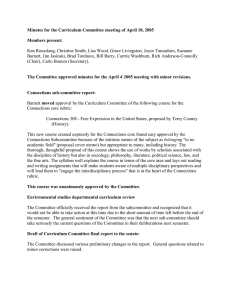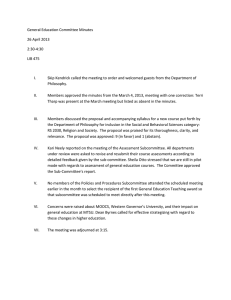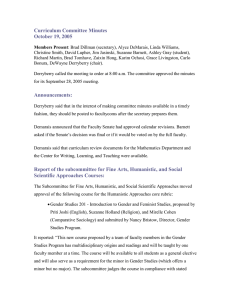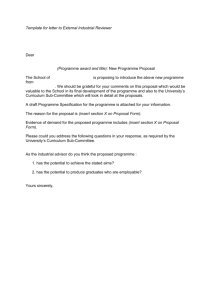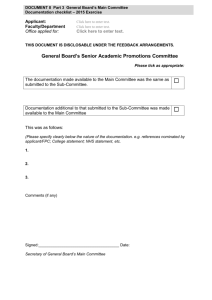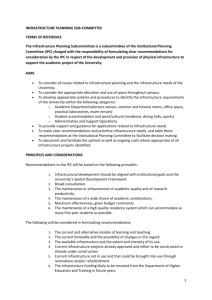Curriculum Committee March 9, 2006
advertisement
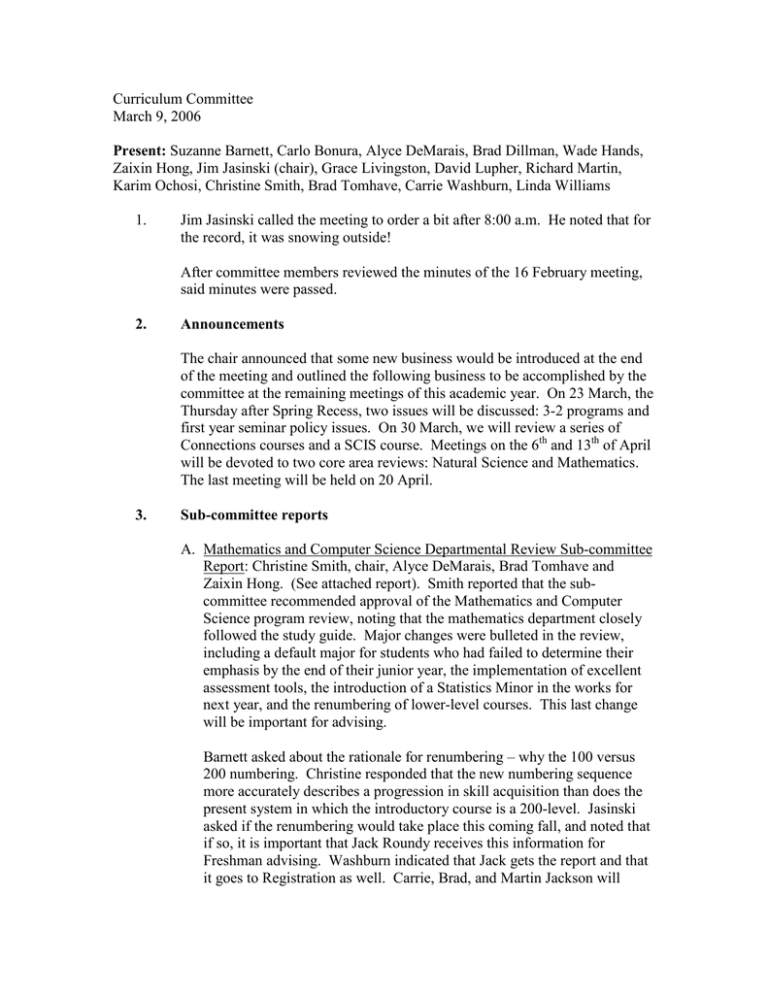
Curriculum Committee March 9, 2006 Present: Suzanne Barnett, Carlo Bonura, Alyce DeMarais, Brad Dillman, Wade Hands, Zaixin Hong, Jim Jasinski (chair), Grace Livingston, David Lupher, Richard Martin, Karim Ochosi, Christine Smith, Brad Tomhave, Carrie Washburn, Linda Williams 1. Jim Jasinski called the meeting to order a bit after 8:00 a.m. He noted that for the record, it was snowing outside! After committee members reviewed the minutes of the 16 February meeting, said minutes were passed. 2. Announcements The chair announced that some new business would be introduced at the end of the meeting and outlined the following business to be accomplished by the committee at the remaining meetings of this academic year. On 23 March, the Thursday after Spring Recess, two issues will be discussed: 3-2 programs and first year seminar policy issues. On 30 March, we will review a series of Connections courses and a SCIS course. Meetings on the 6th and 13th of April will be devoted to two core area reviews: Natural Science and Mathematics. The last meeting will be held on 20 April. 3. Sub-committee reports A. Mathematics and Computer Science Departmental Review Sub-committee Report: Christine Smith, chair, Alyce DeMarais, Brad Tomhave and Zaixin Hong. (See attached report). Smith reported that the subcommittee recommended approval of the Mathematics and Computer Science program review, noting that the mathematics department closely followed the study guide. Major changes were bulleted in the review, including a default major for students who had failed to determine their emphasis by the end of their junior year, the implementation of excellent assessment tools, the introduction of a Statistics Minor in the works for next year, and the renumbering of lower-level courses. This last change will be important for advising. Barnett asked about the rationale for renumbering – why the 100 versus 200 numbering. Christine responded that the new numbering sequence more accurately describes a progression in skill acquisition than does the present system in which the introductory course is a 200-level. Jasinski asked if the renumbering would take place this coming fall, and noted that if so, it is important that Jack Roundy receives this information for Freshman advising. Washburn indicated that Jack gets the report and that it goes to Registration as well. Carrie, Brad, and Martin Jackson will discuss whether the changes will occur in the 2006-07 academic year, or the following year. With no further discussion, the motion to accept the review passed. B. SIM Sub-committee Report: David Lupher, chair, Zaixin Hong, Wade Hands, Brad Tomhave, Alyce DeMarais. Lupher reported on the two proposed independent major applications. (See attached reports). The SIM sub-committee recommended the approval of Katarina Jones’s “Criminology” interdisciplinary major, although not by unanimous vote. DeMarais dissented because of the restricted scope of the major. It was noted that the major, which relies on three units from the Melbourne overseas program, was facilitated by and seemed a rationale for participation in this study abroad program. Lupher noted that the reason for the request was not just to utilize the Melbourne program, but that the major benefited from the offerings at that campus. Williams asked if there was no other way to accomplish the goals of the program with a major and minor rather than a new major. Hands reported that the proposal was very articulate and had strong faculty support. Anderson-Connelly, her advisor, strongly supported the program. The student was happy to change the original title to simply “Criminology.” The sub-committee moved to reject a second SIM proposal put forward by Kelsea Ricker, “Business Major with an Emphasis in Psychology.” It seemed that the proposal was less an interdisciplinary major than an umbrella to cover courses already taken at the University of Puget Sound, and to simulate a minor in Psychology which does not exist at UPS. Dillman asked if it is too late by Junior or Senior standing to submit this application. Lupher argued that the purpose of a SIM is to develop a course of study that can not be pursued otherwise, as outlined in the Logger, but he did not see this reflected in the present study. Barnett observed that the proposal seemed mechanically put together. Lupher noted as well that the student is part of the Honors program, and as such could pursue these goals in an Honors thesis. Both motions (recommendation of the “Criminology” and denial of “Business/Psychology”) of the sub-committee were passed. C. Connections Sub-committee Report. David Lupher, chair, Suzanne Barnett, Bradford Dillman, Christine Smith, Alyce DeMarais, Ashley Gray. Lupher, this time as chair of the Connections Sub-committee, reported that the sub-committee moved to approve STS 361, “Mars Exploration,” noting that Bates and Evans responded clearly to all of the questions from the sub-committee. Barnett observed that the subject itself is interdisciplinary. Jasinski asked if questions from the previous year’s sub-committee review had been addressed. Barnett replied that yes, they have been, and the course has been restructured. The recommendation to approve STS 361 passed. D. Dual-Degree Engineering. Sub-committee chair Grace Livingston moved that the Curriculum Committee accept the five-year Review of the DualDegree Engineering Program (report attached). The department is working to stay connected with students after they depart from UPS. Barnett asked how this review would impact the 2-3 discussion. Jasinski replied that that discussion would take place later and would not affect the review process at this point. With no further questions, the program review passed unanimously. 4. New Business Jasinski reported that he received an email on 8 March asking that the Curriculum Committee consider for approval a new program in Neuroscience later this semester. JJ worried that we would not have time to adequately address the proposal. Washburn clarified that the proposal is for an Interdisciplinary Transcript Designation Emphasis (similar to Asian Studies) in Neuroscience, not a degree program. This program will complement the new Health and Human Science facilities that are being planned. The Emphasis would have a gateway course and a senior seminar. The proposal was not intended to be developed and rushed through for the 2006-2007 academic year; however, it would be important to get the process moving. Jasinski asked if we wanted to take this on this late in the semester given what else the committee needs to finish this year. DeMarais clarified further that the first two courses, an Introduction to Neuroscience and a Senior seminar would be set for 2007-2008 at the earliest. After some discussion about the feasibility of taking up this proposal this year, Jasinski decided to check with John Finney regarding the level of importance for this proposal and will let us know what he finds. The meeting adjourned at 8:55 a.m. MATH & COMPUTER SCIENCE DEPARTMENTAL REVIEW SUBCOMMITTEE REPORT Motion: The subcommittee [Christine Smith (Chair), Alyce DeMarais, Brad Tomhave and Zaixin Hong] recommends acceptance of the review Math & Computer Science departmental review. The subcommittee was impressed with the thoroughness with which M&CSCI addressed the questions in the “Self-Study Guide”. In response to their review, the subcommittee generated a list of questions to which M&CSCI responded satisfactorily. The following are some highlights of the review: • Implementation of ‘default majors’ for students to use if they do not develop their own major. (M&CSCI currently use ‘contract majors” so that students can tailor their degrees to their particular interests in these fields.) • Renumbering some of lower-division math courses. An example of this is MATH 271 The Elements of Applied Statistics which will become MATH 160 Introduction to Statistics. In addition there will be some minor changes to the catalogue description of particular courses. • Changes to the Math minor that will require students to take two classes numbered at 170 (under the new system) or higher and which cannot be fulfilled by PHIL 273. • An increase in teaching units for the instructor supervising student projects in CSCI 340 and CSCI 460. • Excellent departmental assessments of student learning in MATH 232. M&CSCI have developed a rigorous assessment tool, based on both content and writing, which they have used to determine that student understanding of linear algebra is satisfactory. They have used a similar assessment tool for Statistics (MATH 272) and are currently developing one for CSCI 261. • Continued offering of the Computer Science/Business major. Although the number of students choosing this major has been low, M&CSCI believe that this major continues to serve students well, is likely to increase in enrollment and that since it is not an administrative burden, it should be continued. • A statistics minor is being considered, however they do not plan to develop it until next year at the earliest. The Connections Sub-Committee moves approval of STS 361 (Mars Exploration) for Connections Core status. The Sub-Committee (David Lupher, Chair; Suzanne Barnett, Bradford Dillman, Christine Smith, Alyce Demarais, and Ashley Gray) met at 8:30 AM on Thursday, March 2, to discuss Bernie Bates' class as a candidate for Connnections Core status. We were, on the whole, quite impressed with this course, but we had some questions. Above all, we wanted to know how the various disciplines involved in Mars exploration would be integrated and brought into dynamic relationship with each other in this course. We received extensive replies not only from Prof. Bates, but also from Prof. James Evans. We found these responses to be adequate. As one member of the subcommittee put it: While Bernie's answers to questions about how he would integrate the disciplines in this class and bring them into close interaction could have gone one step further, I agree they are generally adequate, good-faith responses to our questions. It appears to me that each "discipline" that Bernie engages is itself interdisciplinary: planetary science and the history of science and technology. The former includes perspectives and empirical knowledge from a number of "hard" sciences, while the latter includes analysis of changing historical beliefs, the effects of public policy, and the socio-political constraints on "normal" science. The clarifications from Bernie and Jim do convince me that a variety of perspectives will be brought to bear on a common subject (Mars), even if the disciplinary boundaries of those perspectives are somewhat difficult to specify. Accordingly, the sub-committee moves approval of STS 361 for Connections Core credit. The SIM Sub-Committee moves acceptance of the SIM proposed by sophomore Katarina Jones, "Comparative Criminology and Criminal Ethics." The Sub-Committee (David Lupher, Chair; Zaizin Hong, Wade Hands, Brad Tomhave, Alyce Demarais) met at 2:30, Monday, March 6. The sponsors of Katarina Jones' proposed SIM were Richard Anderson-Connolly (Comp. Soc., prospective advisor), Judith Kay (Religion), and Mark Reinitz (Psychology). Ms. Jones' proposal struck the committee as an impressive conglomeration of classes approaching crime and punishment from the perspectives of Comparative Sociology, Psychology, and Religion. A key component of this SIM will be classes in criminology that Ms. Jones plans to take in a semester of study abroad at the University of Melbourne. Though the proposal struck us all as an industrious piece of work, backed up by eloquent and enthusiastic letters of support from faculty sponsors, some members of the subcommittee were concerned that this SIM had too narrow a focus. Also, it was felt that the title doesn't accurately reflect the proposed course of study, for it suggests both a comparative international survey and a philosophical contemplation of crime and punishment. Ultimately, these objections did not prevail, though it was agreed that a change of title (to simply "Criminology") be suggested. It should be recorded, however, that one member of the sub-committee persisted in voting against the proposal, largely on the issue of insufficient breadth. The SIM Sub-Committee moves rejection of the SIM proposed by junior Kelsea Ricker, "Business Major with an Emphasis in Psychology." At the same sub-committee meeting mentioned above, the proposal of Kelsea Ricker, a senior Business Major, was discussed. The sponsors of her SIM proposal were Paula Wilson (Business, prospective advisor), Susan Stewart (Business), and Sarah Moore (Psychology). Ms. Ricker declared that the "overall intent" of her SIM proposal was "to achieve a business degree while more formally recognizing the psychology classes I have taken." As this statement implies, the psychology classes in question are classes that Ms. Ricker has already taken—none are part of a proposed course of study for the future. Indeed, it struck the members of the sub-committee that her proposed SIM was really less a proposal of an interdisciplinary schedule of classes to be taken than it is a request that a new label be put upon her present course of study—a course of study that she will be completing next year, SIM or no SIM. Indeed, it appeared that this proposal was an attempt to use the SIM designation in order to compensate for the fact that the UPS Psychology Department does not offer a minor. The re-labeling that Ms. Ricker requests appears to be an attempt to draw the eyes of employers or grad schools to what her transcript clearly reveals: that she has a strong interest in the psychological aspects of business and that she has accordingly taken several Psychology electives. The subcommittee did not believe that this is an appropriate use of the SIM process and designation. Accordingly, it unanimously recommends respectful rejection of this proposal. DUAL-DEGREE ENGINEERING PROGRAM The Dual-Degree Engineering Subcommittee recommends approval of the curriculum review report of the Dual-Degree Engineering Program . ________________________________________________________________ ______ MOTION • I move approval by the Curriculum Committee of the DualDegree Engineering Program five-year review report thereby reaffirming the program. ________________________________________________________________ ______ COMMENTS The Subcommittee found the report to be informative, giving an adequate sense of the different components that comprise the substance this interdisciplinary Program. The Subcommittee had two main recommendations for the Program. One recommendation concerned the area of assessment. The Subcommittee suggested that the Program work on collating and formalizing the mechanisms used to keep contact with the progress of UPS students who leave after completing their third year to embark on Engineering Programs at affiliate institutions. In the second recommendation, the Subcommittee notified the Program that the 3-2 curricular arrangement was due to be discussed soon in relation to the broader UPS curriculum by the Curriculum Committee, and thus there may be issues arising from this discussion to which the Program may need to give some attention. Dual-Degree Engineering Program Subcommittee Alyce DeMarais Karim Ochosi Brad Tomhave Grace Livingston (chair) DUAL-DEGREE ENGINEERING REPORT
